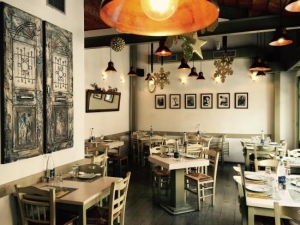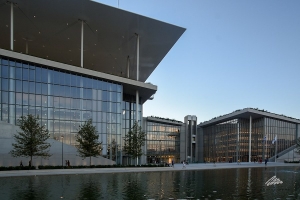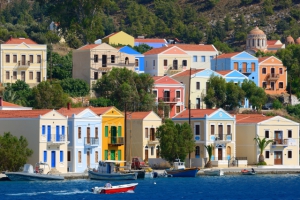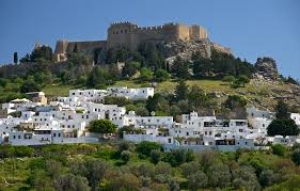WELLNESS HUB
XpatAthens
Rakaki - A Modern Cretan Tavern In Athens
SNFCC Through Your Lens - Calling All Photographers
For more information, please visit: SNFCC
Traditional Orange Spoon Sweet
Check the below recipe for an easy-peasy recipe for a delicious orange spoon sweet that will excite your guests' palate!
Ingredients
2 kilos oranges
800 g granulated sugar
800 g water
1 tablespoon glucose
2 star anises
2 pods of cardamom
lemon juice of 1 lemon
To serve
strained yogurt
rosemary
Instructions
-
Remove the zest of the oranges and add it to a bowl. You can add 80 g brandy and 2 tablespoons sugar, and use it as orange extract. Store it in the refrigerator, sealed in a jar.
-
Cut the top and bottom ends of the oranges and then score the rind all around the orange. Carefully remove the peels, wrap them, and pierce them with a toothpick.
-
Transfer the peels to a pot with boiling water and boil for 5 minutes. Drain the water and follow the same process 1-2 more times, depending on the bitterness of the rind.
-
In the same pot add the sugar, the water, the glucose, the anise, the cardamom, the peels of the oranges, and transfer over low heat. Boil for 40-50 minutes.
-
Remove from the heat and add the lemon juice.
-
Let it cool well. The more the syrup is cooling down, the more it will thicken.
-
Serve with yogurt and rosemary. You can store it sealed airtight in a jar, in a cool and dry place.
Celebrating The Christmas Holidays In Athens
Athens may not be on the most popular list for Christmas destinations, however it offers its visitors a wide range of choices, making Christmas a unique experience! To begin with, Christmas in Athens isn't accompanied by bitter cold and snow. Outings outdoors are easily enjoyed and you can even have coffee or lunch under heaters at one of the many great spots in the city. Wander the streets and watch the street performers and listen to the sounds of wandering musicians! Whether they play classical Christmas melodies or Greek traditional carols with a santouri or a clarinet, the outcome is the same - they create this particular spirit of joy and sentiment.
Just like many large cities during at time of year, Athens organize various festivities and events in many locations around the city. The center of festivity is at Syntagma - central square directly in front of parliament; the city Christmas tree is set up and the entire square is decorated festively for the holidays.
The merry and festive mood can be felt just about everywhere. Decorated streets, smiling faces, lights, music, children being photographed with balloons, fairy floss, candy. Let's not forget the freshly roasted chestnuts sold on almost every street corner and of course the lottery ticket vendors, who try to convince you that the new year will most definitely be YOUR LUCKY YEAR!!
The whole festive atmosphere is felt throughout the shopping districts and especially along Ermou Street which is typically full of people shopping and enjoying a leisurely time in central Athens. At Kotzia Square, opposite the City Hall of Athens, there is typically a large market selling books, jewelry, handicrafts, rugs, candy, and lots and lots of other things! Another place which gathers a lot of people within the city is Zappeio - just a quick walk from Syntagma Square. Almost every day in every corner of the city, something is always happening. Concerts, theatrical shows, performances, and all for free! For a complete program of events happening in Athens this Christmas & New Years 2015, please click HERE.
For those who would like to see a little snow and have 3-4 days at your disposal, then Arachova is a close and popular winter destination. It belongs to the county of Viotia, located three hours away from Athens, and where you will find the Parnasos Ski center, with its large slopes offering all levels of difficulty. There are many hotels and guesthouses there, and you may also visit the Oracle of Delphi, located nearby.
If you are fond of snowboarding, then head to the Ski center at Mainalou, in the county of Arcadia. Kalavryta is another great option during the winter in Greece and there you'll find one of the best ski centers in Greece. Another attraction for visitors is the rack and pinion railway, which has operated the route from Kalavryta to Diakofto since 1896, through a landscape of unrivalled beauty.
Celebrating the Christmas holidays in Athens offers something for everyone! Enjoy!
Two “Must Visit” Wildlife Destinations In Greece
Dadia Forest – home of the raptors. In the north-east of Greece lies an area known as Evros Hills, a vast area of almost uninhabited wooded hills. Dadia Forest, at the heart of this area is an extraordinary place of beauty, tranquility and nature. The forest is quite simply THE place in Europe for raptors, with 36 out of a possible 39 species having been recorded – 20 of which breed in the forest.
With so many species there are many exciting bird watching encounters to be had in the forest: Booted Eagle, Short-toed Eagle, Golden Eagle, White-tailed Eagle, Lesser Spotted Eagle, Honey Buzzard, Goshawk, Black Kite and Levant Sparrowhawk to pick out just a few species that may be seen.
In the whole of Europe Dadia it is the only forest where all four species of vulture can be found: Black, Egyptian, Griffon and the Lammergeier, have all been recorded or breed. In recent years the rare Black Vulture has proven something of a conservation success story in Greece, going from around 25 individual birds in the whole of eastern Europe in the 1980s (that were all in the Dadia Forest) up to 28 pairs in 2010 (WWF Greece) and 100 individual birds. There is now a 7,290 hectare area of the forest designated as a protected zone, with an additional 27,000 hectare buffer.
As well as being a wonderful place for birds Dadia has many species of mammals, more than 30. You can find Foxes, Badger, Red squirrels, Souslik and it is even possible (though very rare) to see Wolves. The forest is also home to around 40 species of reptiles and amphibians such as Dahl’s Whip Snake, Nose-horned Viper, Tortoises and the pretty Yellow-bellied Toad.
Mount Chelmos & Vouraikos Gorge National Park – butterfly mountain
Located in the north Peloponnese region is Mount Chelmos, also known as Aroania, a mountain range in Achaea. At its highest the summit range peaks at over 2,300 metres. It is generally damper and more forested than the mountains located in the southern half of the Peloponnese. Chelmos and its environs are one of the best places in the whole of Greece for the naturalist, with a diverse range of habitats and an incredibly rich array of flora and fauna. So rich is this natural bounty that it was declared a National Park, covering and area which extends for 544,000 sq. m.
Chelmos is celebrated as one of the best in Greece for butterflies, with over 100 species recorded. Perhaps its most famous butterfly is the rare and endangered Chelmos Blue, confined to the higher altitudes of Mt. Chelmos and just a handful of other places in Europe. There are plenty of other scale-winged delights to discover: Southern White Admiral, Apollo, Cleopatra, Lattice Brown, Camberwell Beauty, Powdered Brimstone, Southern Swallowtail, Grecian Copper, Nettle Tree Butterfly, Large Tortoiseshell, Queen of Spain Fritillary, Spotted Fritillary, Cardinal, Mountain Small White, Escher’s Blue, Anomalous Blue, Amanda’s Blue, Ilex Hairstreak, Greek Clouded Yellow, Olive Skipper, Oriental Marbled Skipper, Blue Argus, Osiris Blue, Odd-spot Blue, Pontic Blue, Greek Mazarine Blue (helena, often considered a distinct species), Balkan Grayling, Grecian Grayling, Blue-spot Hairstreak, Adonis Blue, Zephyr Blue, Ripart’s Anomalous Blue (pelopi, often considered a distinct species), Meleager’s Blue and many more!
Chelmos is not only adorned by these flying jewels, it is also clothed in a dazzling display of botanical beauty comprising of a very large number of plant species (including numerous endemics) – a mesmerizing sight, particularly in spring. A visit at that time of year can also mean a treat to the senses of the sights and sounds in the forested slopes of birds such as Crossbills, Serins, Bonelli’s Warblers, Nightingales, several Woodpecker species and lots more besides!
Text written and provided by Matt Berry
Calamari Stuffed With Bread Crumbs, Pine Nuts & Raisins
12 medium-sized squid
1/4 cup olive oil, divided
1 small onion, finely chopped
1 garlic clove, minced
1 cup homemade breadcrumbs
3 anchovy fillets, rinsed and chopped
1/4 cup capers, rinsed and chopped
1/4 cup pine nuts, coarsely chopped
1/4 cup golden raisins, plumped in hot water for 30 minutes, chopped
3/4 cup parsley, chopped
2 eggs
2 (500 grams) cans crushed tomatoes
Salt and pepper
Clean the squid by removing the head, fins, and all contents in the body. Peel off the skin and rinse the tubes. Remove the tentacles from the head. Chop the tentacles fine and set aside for the stuffing. Heat 2 tablespoons of olive oil in a skillet and brown the chopped tentacles. Add onion and cook for 5 minutes. Add garlic and cook for another minute. Remove from heat and set aside. In a bowl, combine the breadcrumbs, anchovies, capers, pine nuts, raisins, 1/2 cup parsley and eggs. Add the tentacle mixture. Season with salt and pepper and mix well.
Stuff the squid tubes with the mixture and seal each with a toothpick. Place the remaining olive oil in a skillet over medium heat. Add the stuffed squid and brown on all sides. Add the crushed tomatoes and bring to a boil. Cover and simmer for 20 minutes or until tender. Remove the toothpicks.
Transfer to a serving platter and garnish with remaining parsley.
Source: Mangiabenepasta.com
25% Increase In Online Purchases
Infobank Hellastat has reported a significant growth in recent years in the domestic online market, mainly due to lower prices compared to conventional stores, and Greek consumers’ gradual familiarization with technology.
An ELTRUN survey cited in Infobank Hellastat’s study, shows that in 2013 the sales in Greek and foreign e-shops by Greek consumers amounted to 3.2 billion euros, showing a 25% increase compared to the previous year while the market has grown even further in 2014, as the number of products bought by Greek consumers online increase by 10% throughout the year.
Moreover, the frequency of on-line purchases has also increased from one per month in 2013, to three per two months in 2014. On-line consumers amounted to about 2.2 million in 2013, while in 2012 their number stood at 1.9 million, representing 35% of Internet users, compared with 70% in Western Europe. Furthermore, 60%-65% of purchases are made on Greek websites while 90% of European consumers prefer national websites for their purchases.
To read more, please visit greekreporter.com
By Ioanna Zikakou
Possible Flat Rate VAT At 18%
There are currently three VAT rates (6.5, 13 and 23 percent), as well as a 30 percent discount on each for the Aegean islands. The Finance Ministry has calculated that the average rate comes to 17.025 percent; however, it is also planning to exempt certain drugs and a number of food items, which means that the single rate will have to be pushed up to 18 percent to have a neutral impact on revenues.
If the measure passes and the flat rate of 18 percent is imposed from the second half of the year, households will face a significant added burden as the bulk of their expenses are food and electricity, both of which currently carry a 13 percent VAT rate.
Brussels counters that VAT evasion will be reduced with the introduction of a flat rate, noting that most of the tax dodging concerns services taxed at 23 percent. This was the case when the previous government reduced the rate on catering from 23 to 13 percent.
To read more, please visit: eKathimerini.
Secret Greece: 15 Islands You've Never Heard Of
Forget the hordes of holidaymakers in Kos and Corfu. These undiscovered hideways offer picturesque harbours, authentic villages and traditional Greek cuisine. Love beaches? The pebbly and sandy stretches on these remote islands are just how you like them: tranquil, unspoilt and totally sun-drenched . There's no shortage of ways to stay active on your Greek island getaway, either, as the nature and wildlife on these islands are just waiting to be explored: think waterfalls, hiking trails with sunset views and thermal springs.
If you're in need of a true island escape in Greece, these are the secret places for you. Folegandros (pictured) boasts sugar-cube whitewashed houses, pristine beaches and one of the most appealing clifftop villages in the Cyclades. In unique Chios, you can observe the beautiful village of Pyrgi, with its buildings finely decorated in grey and white geometric shapes. For those who appreciate a pretty harbour, don't miss Symi. This island has one of the most picturesque harbours in Greece, showing off impeccable architecture, cafes and a slow pace of life, unlike its neighbour Rhodes.
Want to experience the Greek islands without the crowds? Here's where you should go...
Kastellorizo
The pretty island of Kastellorizo, which lies 110km east of Rhodes, has a main town that unfolds around the natural harbour with unique architecture and colourful houses. The island's is home to a cluster of islets and offers a wealth of marine life to discover in its clear blue seas. Around the island you'll find cafes, tavernas and shops. The medieval castle and archaeological and folklore museums are several top attractions to visit when you're not at the beach. As tourism is yet to develop you'll only find a selection of hotels - a good place to experience true Greek island life.
Chios
The lesser-known isle of Chios is a unique gem in the north-eastern area of the Aegean Sea. It is best known for its cultivation and production of mastic, an aromatic resin that comes from trees that grow in the Mastihohoria region and forms in teardrop shapes. Pyrgi is one of the island's most beautiful villages, characterised by the fine decoration of its houses featuring grey and white geometric shapes.
Hydra
One of the most romantic places in Greece, Hydra overlooks the Argosaronic gulf and is home to traditional stone mansions, narrow cobbled streets and secluded squares. Cars are banned so people get around by donkey and its heart is the waterfront, featuring picturesque streets, museums, churches and cafés. Hydra is a popular day trip destination from Athens and its best beaches include Limnioniza, Spiliá and Ayios Nikolaos.
Karpathos
Karpathos is part of the Dodecanese complex and lies east of Crete. It is one of Greece's best-kept secrets, a mountainous island full of fresh water springs, vineyards and pine-tree forests. Karpathos' rock caves are home to Mediterranean monk seals and around the island there are marvellous hiking paths, secluded beaches and pretty villages, such as Othos and Olympos.
Schinoussa
Schinoussa is a small island that lies to the south of Naxos and boasts stony landscape that is both beautiful and unspoilt. It is part of the Minor Cyclades group of islands and has just three villages: Chora, Messaria and Mersini. As the island's port, Mersini, once a hideout for pirates, is a haven for small boats and a popular mooring spot for sailing enthusiasts. While on the island, enjoy hiking to observe the unspoilt natural beauty of the island, discover the 15 idyllic beaches and don't miss a walk through the picturesque village of Chora.
To read more, please visit: TravelAol












